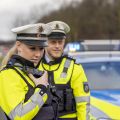Interview with Dr. Daniela Lesmeister
Why do you want to change the supervision of police authorities?
Dr. Lesmeister: In principle, the police do a great job and do a good job. But we've also had cases in recent years that didn't go so well. We remember Lügde and the terrible case of child abuse, where data carriers went missing. We have said that we have to change something in this system. And for us, that means strengthening specialist supervision in order to become even better.
What are the goals of this reorganization?
Dr. Lesmeister: The new structure of specialist supervision is intended to create clear standards in order to identify potential for improvement and undesirable developments in the work of the police at an early stage. The aim is to install a specialist supervisory body that is independent of individual cases and does not only intervene when a problem arises. The LAG is looking at the standards and processes for how supervision will be carried out in the future, as well as the necessary legislative changes.
How do you want to restructure the specialist supervision of the police in NRW?
Dr. Lesmeister: We currently have a two-tier system for the police. This means that the Ministry of the Interior has technical and official supervision over the district police authorities and the higher state authorities. The higher state authorities are effectively an extension of the Ministry of the Interior. We want to change that. We need a tripartite system. The Ministry of the Interior is responsible for top-level supervision. In future, technical supervision of the district police authorities will be carried out by the three higher state authorities (LOB) - the State Criminal Police Office (LKA NRW), the State Office for Training, Further Training and Personnel Affairs (LAFP NRW) and the State Office for Central Police Services (LZPD NRW). The higher state authorities must be strengthened and take over the original technical supervision. The ministry is then the highest authority and only reserves the right to take over supervision in exceptional individual cases. However, official supervision remains with the Ministry of the Interior
At the same time, we want to introduce new instruments. Times have changed and the police are facing new challenges. The core of our working group is therefore so-called "audits", which are independent of specific events.
What do you expect from these "audits"?
Dr. Lesmeister: We want to carry out audits together with the police authorities, but also with the state authorities. These can take place depending on the occasion, but also periodically regardless of the occasion. Together and on an equal footing with the police authorities, the specialist supervisory authority takes a close look at existing processes, identifies errors and eliminates them. This is certainly more work at the beginning. However, I am also certain that these audits lead to fewer errors and therefore ultimately to more quality and less work. You have to think of it like this: We create standards to identify problems at an early stage.
Why are such audits so important?
Dr Lesmeister: In the Lügde case, we saw during the organizational investigation of the Lippe district police authority that there was potential for improvement in various places. We were able to use our tools to analyze and eliminate errors. But with our new approach, we want to act in advance to ensure that such errors are identified in good time and can be avoided.
What is checked during an audit?
Dr. Lesmeister: During an audit, processes that take place in an authority are examined. First, the documents are checked. Then the individual managers are interviewed. We then look at the processes in practice. We make sure that standards are adhered to. It is particularly important that we work across all directorates. All organizational units are involved here.
How are these audit teams made up?
Dr. Lesmeister: It is very important to us that there are very experienced civil servants at the top. After all, you can only advise other authorities if you have broad operational experience and knowledge. These should not only be people who do this on a full-time basis, but also on a part-time basis. In addition to their actual duties as police officers, we want them to get involved in this area.
Will new offices be created for the reorganization of specialist supervision?
Dr Lesmeister: The specialist supervision of the district police authorities should remain anchored in the higher state authorities. And in the departments that already deal with controlling. However, with the new tripartite system of specialist supervision, the three higher state authorities will once again become genuine specialist supervisory bodies and their function will be strengthened accordingly. For this task, 21 additional posts were initially included in the budget negotiations for 2021.
The higher state authorities are thus moving closer to the district police authorities and will work together systematically and holistically on an equal footing, not only in current cases such as child abuse in Lügde or extremism in Hamm. The main aim is to develop solutions together in dialog with the employees in the police authorities.
What will change for the employees in the district police authorities?
Dr. Lesmeister: It's about two things: firstly, all police employees will receive standards and solution concepts for their daily work through the closer exchange. Secondly, closer and regular cooperation will make everyone aware of potential weaknesses at an early stage.
What are the next steps towards reorganization?
Dr. Lesmeister: A reorganization of this kind can only be implemented sustainably together and in partnership. Therefore, in addition to the higher state authorities, the early involvement of police headquarters and district authorities in the design process is also important. Representatives from district police authorities are integrated into individual sub-projects. A police chief and a district administrator are represented on the steering committee.
We are following a tight schedule in the LAG Supervision. We submitted a draft bill to amend the Police Organization Act (POG) to the cabinet in spring 2020. By the end of the year, the first implementations should already have taken place at the LKA NRW. The other higher state authorities LAFP NRW and LZPD NRW will then follow at the beginning of 2021. However, all steps will also depend on the further development of the pandemic.

